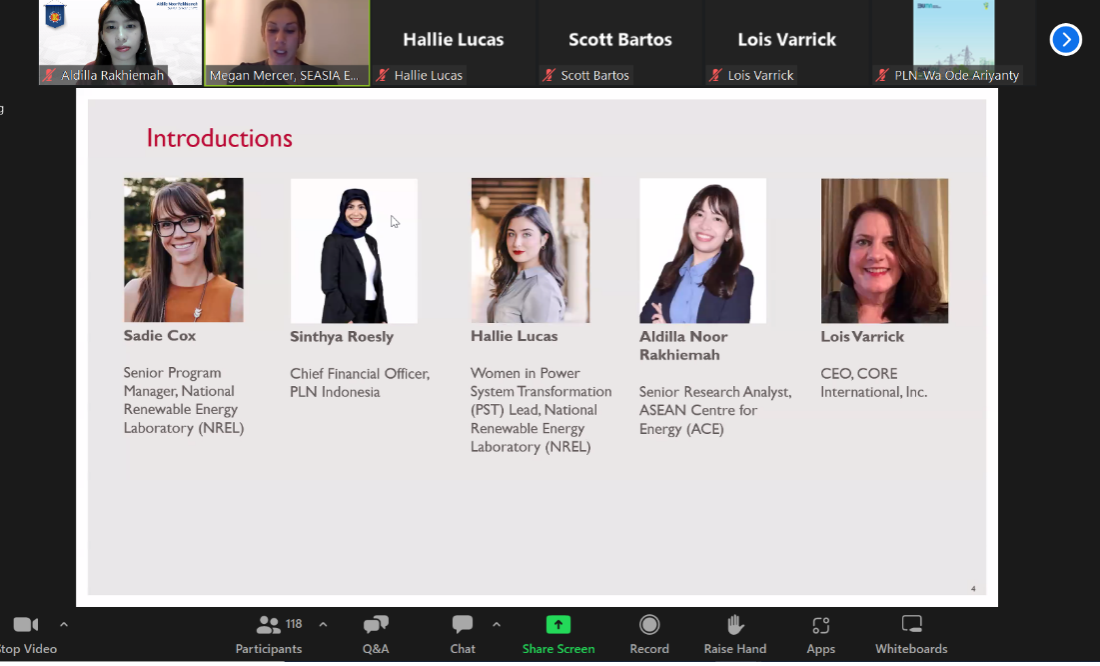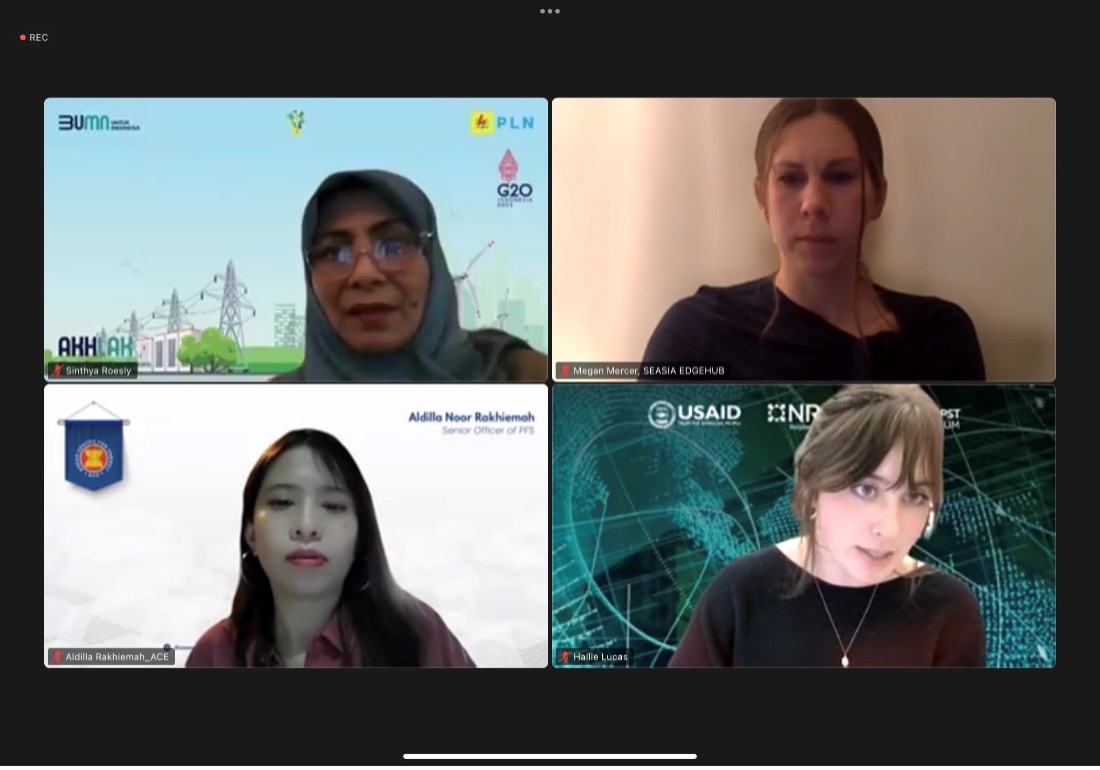Menu
Online, 25 January 2023The ASEAN Centre for Energy (ACE) Senior Researcher, Aldilla Noor Rakhiemah, was invited as one of the guest speakers to the Women in Power System Transformation webinar initiated by the United States Agency for International Development (USAID), National Renewable Energy Laboratory (NREL), and the Global Power System Transformation (G-PST) Consortium. The webinar was held on January 25, 2023 with the title of “Training the Workforce of the Future: Gender Equity Resources and Free Technical Teaching Materials for Power System Transformation.”.
The discussions featured speakers from the ACE, PLN Indonesia, NREL and CORE International, Inc highlighting gender diversity and equality in the ASEAN energy sector, the importance of gender-diverse system operator workforce, Women in Power System Transformation (Women in PST) initiative and Enhancing Equality in Energy in Southeast Asia (E4SEA) internship and mentorship opportunities.  (Photo caption: Introduction to the speakers in the WomeninPST webinar.)Aldilla, who is also Senior Researcher for the ASEAN Climate Change and Energy Project (ACCEPT) Phase 2, delivered a comprehensive presentation on gender equality programs at the ASEAN Centre for Energy (ACE) through ACCEPT II. ACCEPT II’s gender equality programs are based on one of its three outcomes, “Strengthened regional structure, capacity, and gender equality on energy-climate nexus,” with the output of “Promoting gender equality in the energy sector.”
(Photo caption: Introduction to the speakers in the WomeninPST webinar.)Aldilla, who is also Senior Researcher for the ASEAN Climate Change and Energy Project (ACCEPT) Phase 2, delivered a comprehensive presentation on gender equality programs at the ASEAN Centre for Energy (ACE) through ACCEPT II. ACCEPT II’s gender equality programs are based on one of its three outcomes, “Strengthened regional structure, capacity, and gender equality on energy-climate nexus,” with the output of “Promoting gender equality in the energy sector.”
Furthermore, Aldilla underlined the regional perspective of women in ASEAN. World Bank’s data illustrated the percentage of women and men in the ASEAN labor force. In 2021, 43% of women were part of the labor force, compared to the remaining 57% being men. Aldilla explained that despite the outwardly progressive equality, most women are still limited to the informal sector. A deeper analysis of the figures revealed that within the 43% of ASEAN women in the labor force, 67% of them are working in the informal force while only a small portion of women (33% out of the 43% total labor force) are involved in the formal sector. This trend is further emphasized in the energy sector, with only 8% of women involved in the production of crude, petroleum, and natural gas.  (Photo caption: Sinthya Roesly, Megan Mercer, Aldilla Rakhiemah, and Hallie Lucas in the WomeninPST webinar.)Putting the data into consideration, she identified several challenges and opportunities that ASEAN should navigate through. The challenges involve the lack of data on gender in the energy sector, the risks of fossil fuel to women and ASEAN’s current reliance on it, and ASEAN’s energy demand which is projected to triple by 2050. On the other hand, opportunities also come in the form of ASEAN’s commitment to support gender equality and just energy transition as reiterated in the 39th ASEAN Ministers on Energy Meeting and ASEAN Leaders Statement on the 55th ASEAN anniversary.
(Photo caption: Sinthya Roesly, Megan Mercer, Aldilla Rakhiemah, and Hallie Lucas in the WomeninPST webinar.)Putting the data into consideration, she identified several challenges and opportunities that ASEAN should navigate through. The challenges involve the lack of data on gender in the energy sector, the risks of fossil fuel to women and ASEAN’s current reliance on it, and ASEAN’s energy demand which is projected to triple by 2050. On the other hand, opportunities also come in the form of ASEAN’s commitment to support gender equality and just energy transition as reiterated in the 39th ASEAN Ministers on Energy Meeting and ASEAN Leaders Statement on the 55th ASEAN anniversary.
In recent years, ACE has remained committed to gender equality goals, especially by including a majority of women in their team. In 2023, 53% of ACE’s employees are women. For the past 4 years, at least 50% of the ACCEPT team are women. Women are also highly involved as speakers, as revealed by data that 56% of the speakers at ACCEPT events in 2021 being women.
As final key takeaways, Aldilla concluded that the power sector in ASEAN and all over the world is still dominated by men. To accelerate innovation and ensure effective problem-solving, the involvement of women is highly necessary. Therefore, the ASEAN Centre for Energy through ACCEPT II is committed to promote women’s empowerment and women’s vital role as agents of change towards a low carbon society.
